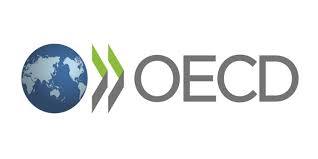
The Organization for Economic Cooperation and Development has cut its outlook for South Korea’s growth this year by 0.3 percentage point, reflecting the fallout from the new coronavirus, the Ministry of Economy and Finance said Monday.
In its biannual Interim Economic Outlook, the OECD forecast that the world economy would expand 2.4 percent this year, down 0.5 percentage point from its earlier prediction in November last year. The outlook for next year, in contrast, was raised 0.3 percentage point to 3.3 percent.
In between biannual economic outlook reports, released in May and November every year, the organization of advanced economies issues interim outlook reports twice a year with updates on the Group of 20 nations.
“The global economy in 2020 is expected to grow 2.4 percent (on-year), as the global value chain, tourism industry and financial markets feel the impact of COVID-19,” Seoul’s ministry said, citing the OECD report.
“The growth rate will recover to the 3.3 percent level in 2021 as the influence of COVID-19 phases out.”
The individual growth forecast for Korea this year was lowered to 2 percent, down 0.3 percentage point from the earlier figure, due to the country’s close economic ties with neighboring China. The corresponding figure for next year was maintained at the conventional 2.3 percent.
“The degree of downward adjustment was lower for Korea than other countries affected by the coronavirus,” Seoul’s ministry said.
For Japan, Australia and Italy, the OECD cut its growth outlook for this year by 0.4-0.5 percentage point.
The latest forecast was based on the presumption that the fallout from the epidemic in China -- where it originated -- would peak during the first quarter and then dissipate, without significantly affecting other countries.
China, however, will continue to face a prolonged impact throughout the rest of the year and likely see its growth pace linger around a lower-than-expected 4.9 percent this year, according to the OECD.
Besides COVID-19, other downside risks the OECD identified included persistent trade tensions, financial volatility and the unstable relationship between the European Union and Britain.
To respond to the slowing economy, the OECD recommended monetary easing, calling it essential, on the condition that such actions are undertaken in tandem with matching fiscal policies and structural reforms.
In the case of Korea, a preemptive policy rate cut could facilitate the recovery of market sentiment and debt issuance, it added.
The Bank of Korea last week froze the country’s base interest rate at the current 1.25 percent, while lowering its growth forecast for this year to 2.1 percent, down 0.2 percent from the previous figure. The next session of the BOK’s rate-setting Monetary Policy Board is slated for April 9.
By Bae Hyun-jung (
tellme@heraldcorp.com)




![[Herald Interview] 'Trump will use tariffs as first line of defense for American manufacturing'](http://res.heraldm.com/phpwas/restmb_idxmake.php?idx=644&simg=/content/image/2024/11/26/20241126050017_0.jpg)

![[Health and care] Getting cancer young: Why cancer isn’t just an older person’s battle](http://res.heraldm.com/phpwas/restmb_idxmake.php?idx=644&simg=/content/image/2024/11/26/20241126050043_0.jpg)

